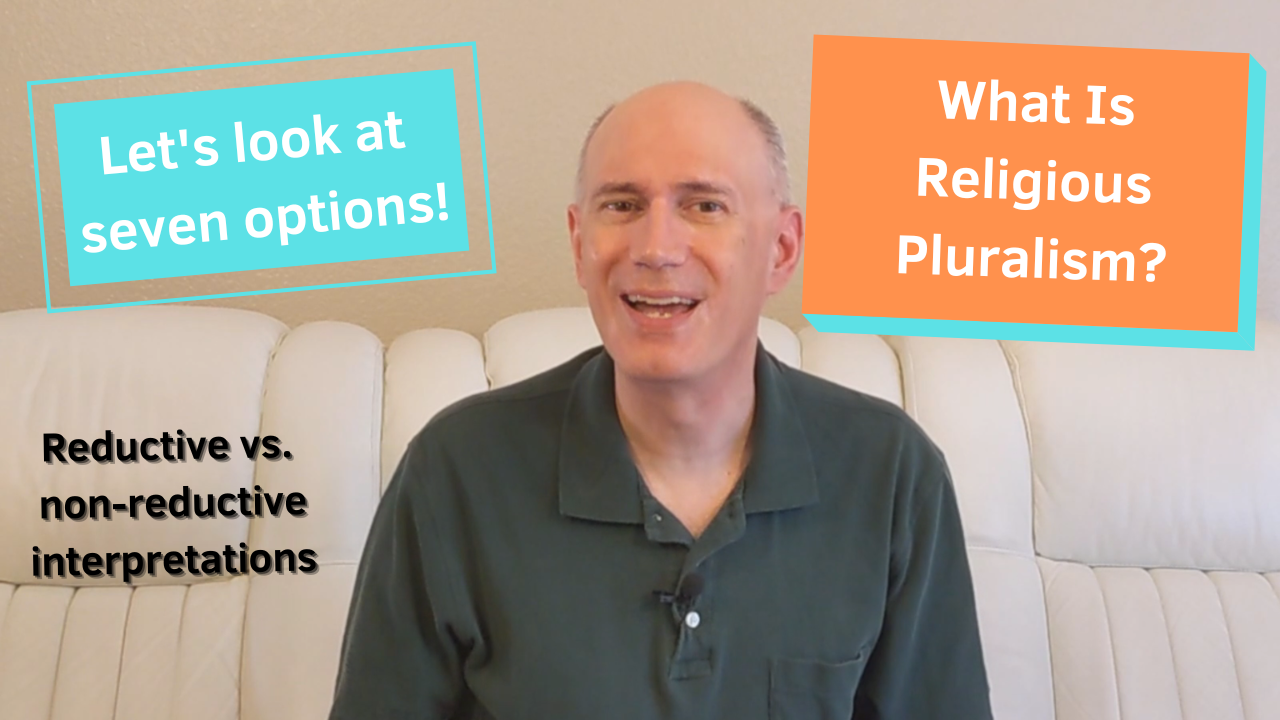06/15/2022 – What Is Religious Pluralism?

What is religious pluralism? Doesn’t it mean there’s more than one religion? In a word, no. There are actually many kinds of religious pluralism as well as two different ways of categorizing them. You want to find out what they are? Good, ‘cause I’m about to tell you. This is TenOnReligion.
Hey peeps, it’s Dr. B. with TenOnReligion. If you like religion and philosophy content one thing I really need you to do is to smash that sub button because it really helps out the channel. The transcript is available at TenOnReligion.com and I also have a ko-fi linked in the description if you’d like to help out the channel and help me keep this baby going.
Many religious scholars, myself included, have used the phrase “religious pluralism” in a rather flippant way assuming that our hearers and readers somehow know exactly what we’re talking about. It does not simply mean a plurality of religions, as in, there is more than one. It goes way deeper than that. In actuality, religious pluralism can mean a lot of different things. It’s all based on value judgments in comparing religions. But what does that mean? When one compares an apple with an orange, what are the criteria? Size, taste, color, texture, something else? There’s not just one religious pluralism but many religious pluralisms based on what value one is assigning to the comparison of religions. Let’s take a look at seven different options to help us better understand what religious pluralism could mean and then stick around to the end where I talk about two ways of categorizing them, because that’s hugely important.
First, soteriological religious pluralism. This means more than one religion is effective in guiding people to salvation. Now, this is obviously problematic because what is “salvation?” It’s largely a Christian-specific term. One could attempt to replace salvation with something like “religious goal” such that more than one religion is effective in guiding people to the religious goal, but that doesn’t work either because religions do not generally recognize or accept the goals of other religions. So, using the value of salvation is a rather limited way of understanding religious pluralism.
Second, normative religious pluralism. This has to do with how followers of one religion are supposed to treat followers of another religion. There should be no difference in one’s behavior towards followers of other religions. Now this doesn’t quite make sense because participating members of a religious community generally have obligations to one another and often recognize special rights for one another. But what I think normative religious pluralism is getting at is the idea that if one is an adherent of a religious community, they then have no obligations towards adherents of any other religious community, even to the extreme point of taking all of their land and resources and killing them. Yikes. Many religions, at some point and place in their history have had this view and normative religious pluralism is trying to safeguard against going there, which is an admirable desire. But normative religious pluralism is still a little unclear where exactly the dividing line is on how one treats insiders and outsiders.
Third, epistemological religious pluralism. More than one religion is epistemologically justified based on some external criteria. Now it’s obvious that there are significant difficulties with this in that who gets to decide what the criteria are and on what basis is that decision made? It seems awfully political in that whoever has the power and is doing the talking gets to control the conversation. But, despite that, what this does affirm is that just because someone holds a different set of religious beliefs than we do does not mean that they are irrational. There could be a perfectly rational and reasonable explanation to be a follower of blank. Fill in the blank with any religion.
Fourth, aletheia religious pluralism. Aletheia is a Greek word meaning not being hidden, or disclosed, or revealed, something like that. Basically, aletheia religious pluralism is about the truth of beliefs. One could attempt to hold the position that all religions are equally true, but they have beliefs that are contradictory. So that won’t work unless one has an incredibly expansive idea of what truth means. One way out of this dilemma is to claim that religions have, in one way or another, reference to something infinite. Since humans are finite, it’s impossible to fully disclose the infinite to us, thus more than one religious tradition can be true. This is sort of what John Hick does, but such a perspective implies that not only do we not know the full truth value of any religion, we can never know it, at least not until the infinite can be accessed. And I have no idea exactly what that means.
Fifth, ethical religious pluralism. This means neither the adherents nor the teachings (or both) of one religion are morally superior to all other religions. The idea is that the standards for morality are very similar in many religious traditions. This may be the case in a more general perspective like some sort of golden rule mentality, but the moral treatment of individuals does vary in certain circumstances in each religion. There does seem to be some sort of tribal aspect of this so it seems clear that adherents of one religion generally hold their moral standards to be both different and superior to the moral claims of other religions. So, it depends on whether one is focused on the big picture or the small picture.
Sixth, deontological religious pluralism. Now don’t get hung up on the word “deontological” because what this version simply means is this: can one fulfill religious obligations equally through more than one religion? It’s about being obligated by some religious idea or agent to do certain things, specifically religious rituals or actions. If one has to confess one’s sins or treat their parents in a certain way or abstain from eating certain foods, can one accomplish this through more than one religion? Exclusivists would obviously say no while pluralists would say yes, or at least, maybe.
Seventh and last, hermetic religious pluralism. This is more of a mystical view in that all religions share some common core, which is rather esoteric. All religions are equally effective in reaching or achieving ultimate knowledge and wisdom about this rather vague thing “out there.” How do we know that this mystical common core is all the same in traditions from different continents? There’s so much vagueness here and it seems so subjective. This one’s a bit tricky, and…yeah.
I’m going to run through the list again and then say one more thing which is hugely important for understanding religious pluralism. So, we have soteriological religious pluralism, normative religious pluralism, epistemological religious pluralism, aletheia religious pluralism, ethical religious pluralism, deontological religious pluralism, and hermetic religious pluralism.
Now the one thing that’s hugely important is that religious pluralism could be understood in a reductive or non-reductive way. This is a big deal. A religious pluralism with reductive tendencies reduces religions down to what is common between them. What is different is ultimately non-essential. What is similar or the same is the core of religion according to that religion. A religious pluralism with non-reductive tendencies holds that what is unique or different in each religion is what makes it special. Since religious traditions have some rather obvious similarities, one cannot go too far in making the claim that whatever is unique or different about one’s own religion forces one to be on the extreme end of the exclusivity continuum. Rather, one’s religious lifestyle guides one in a special way even though there are some shared commonalities with other religions. In non-reductive pluralism these different ways of being religious should be celebrated and respected. And there you have it!
I hope you’ve enjoyed this parsing out of different ways of looking at religious pluralism based on underlying values. Leave a comment below and let me know which version you think works best and why. Until next time, stay curious. If you enjoyed this, support the channel in the link below, please like and share this video and subscribe to this channel. This is TenOnReligion.


